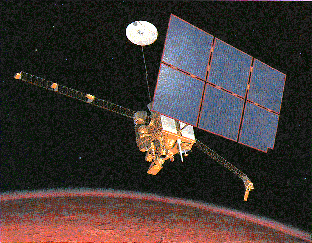|
|
Mars Observer

The Mars Observer mission spacecraft was primarily designed for
exploring Mars and the Martian environment. However, in addition to
its planetary payload, Mars Observer carried some high energy astrophysics
instruments, including a gamma ray spectrometer.
Mars Observer was launched on September 25, 1992 from Kennedy Space Center
aboard a Titan III rocket. The spacecraft was lost in the vicinity
of Mars after (most probably)
an explosion of the fuel and oxidizer elements on
August 21, 1993 when the spacecraft began its maneuvering sequence for
Martian orbital insertion.
While intended as a gamma-ray spectrometer (GRS) for mapping the Martian
surface composition from orbit, the GRS was also capable of suspending this
function in order to make detailed observations of cosmic gamma-ray bursts.
The n-type Ge detector was 5.5 cm in diameter and length. Passive cooling
kept the crystal at less that 100K. A combined anti-coincidence shield and
neutron system surrounding the Ge crystal rejected cosmic-ray and neutron
events when a burst mode had been triggered. The energy range covered for
bursts was 0.5 - 2.0 MeV, with some 1024 energy channels available. Energy
resolution of 2.7 keV at 1.333 MeV was achieved. During a burst trigger, data
could be accumulated into a minimum of 16 ms intervals.
The Mars Observer spacecraft did very little science during its cruise
phase to Mars to save on costs, but approximately two months of total data
from the gamma ray spectrometer were successfully collected, including
spectral observations of one burst, GB930706, for which the VLA obtained radio
observations approximately eight days later. Preliminary analysis of the Mars
Observer data also shows some information for approximately twenty other burst
sources detected by Ulysses and Compton Observatory, though none triggered the
Gamma Ray Spectrometer to interrupt its mapping functions to observe the source
directly.
- Laros, J.G. et al 1994, AIP 307, Gamma Ray Bursts, Second
Workshop,32.
[Gallery]
[All Missions]
[by Time]
[by Energy]
Page authors: Lorella Angelini Jesse Allen
HEASARC Home |
Observatories |
Archive |
Calibration |
Software |
Tools |
Students/Teachers/Public
Last modified: Thursday, 26-Jun-2003 13:48:16 EDT
|


